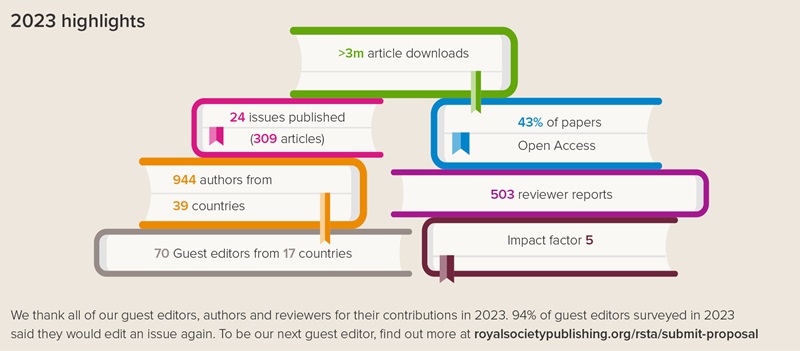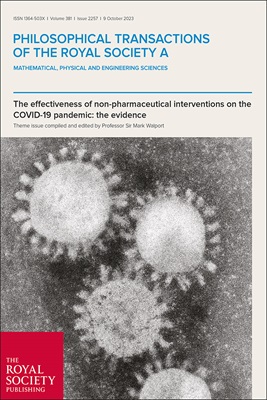As the longest-running scientific journal in the world, having been founded in 1665 by Henry Oldenburg, Philosophical Transactions A is now moving into its 382nd Volume. Although a lot has changed in academic publishing since Phil Trans A started publishing theme issues in the 1990s, the journal continues to publish high-quality issues guest edited by leading scientists across the physical sciences. In this blog, we look back on the top papers and theme issues published in 2023.

The guest-edited theme issue model of journal publication has come under much scrutiny over the past few months, due to the retraction of large numbers of papers published in ‘special issues’. Despite the special issue model being commoditised and tarnished, we still believe that good theme issues are an important vehicle for synthesising and promoting research areas, and we continue to strive to maintain the high integrity of our content. In 2023 we published a blog post (‘Theme issue publishing at the Royal Society’) and an Editorial (‘Guest-editing under the spotlight’) to show how we do this. With the journal’s checks and balances firmly in place, Phil Trans A continues to publish high-quality research across its wide scope, and 2023 was no exception; from ‘Cognitive artificial intelligence’ to ‘Atlantic overturning: new observations and challenges’, we continue to encourage collaborations between scientists across the globe.
2023 facts and figures
- The journal published 24 issues, containing a total of 309 articles in 5130 pages
- 944 authors from 39 countries
- Over 40% of the journal’s papers were published Open Access
- For original submissions, 1120 reviewers were invited and 503 reviews were completed (from reviewers in 41 different countries)
- In total, the journal online content was accessed over 3 million times in 2023
- The journal’s Impact Factor rose to 5.0. See our website for the journal’s full suite of metrics.
- On average, manuscripts took 42 days to reach their first decision in 2023
- 46% of the journal’s Editorial Board consists of female scientists

The journal’s most-downloaded issue published in 2023 was ‘Radiocarbon in the Anthropocene’, an issue based on a Royal Society Theo Murphy Meeting by the same name and guest edited by Timothy Eglinton, Heather D. Graven, Susan E. Trumbore and Peter A. Raymond. This fully open-access issue explores how studying radiocarbon (14C) in the Earth’s carbon cycle can help us better understand and quantify changes brought about by anthropogenic activities. This issue has been downloaded 21,793 times and features our most-downloaded paper of 2023: ‘A radiocarbon spike at 14 300 cal yr BP in subfossil trees provides the impulse response function of the global carbon cycle during the Late Glacial’. This paper, by Edouard Bard and colleagues, describes the largest solar storm ever identified. It has been downloaded over 18,000 times and was featured in the New Scientist.
In terms of citations, our most-cited issue from 2023 was ‘Probing and dynamics of shock sensitive shells’ guest edited by Simos Gerasimidis, Jan Sieber and J. Michael T. Thompson, and our most-cited paper was ‘Quantum annealing: An overview’ (issue 2241). Other notable issues from the year include ‘Bayesian inference: challenges, perspectives, and prospects’, an issue which celebrates the contributions of Sir Adrian Smith, the President of the Royal Society, to the field of Bayesian inference, and ‘The effectiveness of non-pharmaceutical interventions on the COVID-19 pandemic: the evidence’, an issue edited by Sir Mark Walport and published in conjunction with the Royal Society’s Policy report, 'COVID-19: examining the effectiveness of non-pharmaceutical interventions'.

To find your favourite Phil Trans A issue of 2023, visit our website. Indeed, if your thirst for science history expands beyond Phil Trans A published works, you might be interested to visit the Royal Society’s Science in the Making archive – a website which allows you to explore the work of the Society dating back to 1660.
And if you’re interested in guest editing your own theme issue of Phil Trans A, and publishing alongside the world’s most renowned scientists like Isaac Newton and Stephen Hawking, please visit our website to learn more. We’re always keen to receive proposals for theme issues, whether you’re an ECR looking to gain some editorial experience, or a more-established researcher hoping to create a lasting resource of your field. Find out about the benefits of guest editing today!
-------------------------------------------------------
Cover image: X-ray diffraction from a shock compressed Al target taken at the LCLS facility, MEC end station. Credit S. White and B. Kettle.
